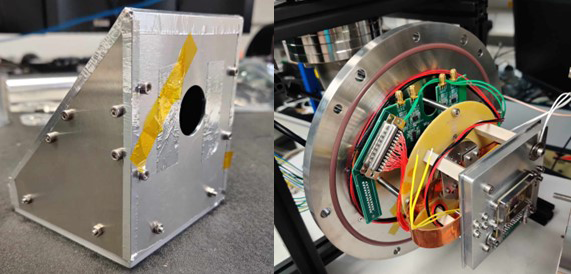The NITEMARES project aims to develop tools to unlock the secrets of Mars. The project is a collaboratio between Open University, Teledyne e2v and the UK Space Agency.
Illustration of a spacecraft looking for subsurface water on Mars. (Image Credit: NASA).
New Delhi: Researchers from Open University led by Manish Patel have collaborated with UK based aerospace and defence manufacturer Teledyne e2v to develop the technology for finding water and other resources on Mars, with support from the UK Space Agency. The project called Novel Infrared Technology for Exploring Mars, Advanced Reconnaissance And Exploration Science (NITEMARES) has a name that highlights the challenges of developing tech for space, and is built on previous studies supported by the UK Space Agency to develop IR technologies to reliably operate in the hostile environment of space. IR cameras can map the composition of the Martian surface, and reveal hidden aspects of the planet.

Cryogenic test equipment on the left and a prototype headboard to test chips on the right. (Image Credit: The Open University).
Infrared surveys of Mars are crucial for pathfinding missions, and reconnaissance of landing sites suitable for humans. Such infrared surveys can identify water trapped in the form of minerals or ice, an essential resource for any crewed missions. Water can be used to extract fuel, which may even be necessary for a return trip, as a single spaceship cannot possibly carry all the fuel necessary to make a return trip to Mars with conventional technologies. In the extreme environments, IR detectors are more better suited as conventional detectors are not precise or reliable enough.
Engineering challenges addressed by NITEMARES
Infrared detectors are extremely sensitive to heat, so the engineers had to find ways to cool the devise, reduce the background infrared radiation as much as possible, and validate the performance after irradiating the device with protons to mimic the conditions the spacecraft can be exposed to in space. The UK Space Agency has picked The Open University to develop IR technology for the planned International Mars Ice Mapper. The technology developed can potentially be adapted for imaging the Earth, defence and commercial applications as well.
Next Article
Follow us on social media

